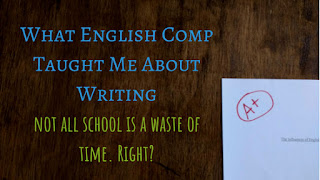What English Comp Taught Me About Writing Stories
A few months ago, I finished up English Comp II (my second time at it because my school wouldn't accept my credits. GRR!). I was annoyed with having to do it again, but it turned out to be rather profitable. I learned several things that reminded me why I believe taking a formal English course is beneficial for us creative writers. Three things, in particular, stand out to me.
~Thesis~
Anyone who has taken an English course knows that creating a good thesis is important to writing a paper. The same goes for story writing. Instead of a thesis, we have themes. The themes are the messages we convey throughout our stories, intentionally or not.
Some writers, myself included, don't typically like to assign a particular theme to a story until at least the first draft is written (with a few exceptions). That's totally cool; most people don't figure out their final thesis until they've written the body of their essay. But once that draft is finished, it's probably a good idea to find out which themes and messages you want to drive home to your reader, so you can clarify those during revisions.
English Comp not only taught me how to find a strong message, but also showed me when it's time to reveal it to the reader. The earlier, the better. Obviously, a theme doesn't have to be as blatant as a thesis does (you know, underlined and everything), but it's important for the reader to subconsciously start recognizing it pretty early on.
Some writers, myself included, don't typically like to assign a particular theme to a story until at least the first draft is written (with a few exceptions). That's totally cool; most people don't figure out their final thesis until they've written the body of their essay. But once that draft is finished, it's probably a good idea to find out which themes and messages you want to drive home to your reader, so you can clarify those during revisions.
English Comp not only taught me how to find a strong message, but also showed me when it's time to reveal it to the reader. The earlier, the better. Obviously, a theme doesn't have to be as blatant as a thesis does (you know, underlined and everything), but it's important for the reader to subconsciously start recognizing it pretty early on.
~Necessary Plot Points~
After we come up with a thesis, we have to come up with points that will prove our thesis. The same goes for stories. We need scenes that show our readers the various sides of our message: the good, the bad, the ugly.
All too often, we novelists get bogged down by our love of side plots and fluff, that we forget what's important to the story. What scenes will get your message across to the reader? What will drive it home and hit your readers' hearts? Focus on those. The other side things are great, but they will never make up for a lack of a real story.
A good question to ask is: If you take away all the fluff, is the story still the same? Will the reader still walk away with something, or did you rely too much on "fillers" to reach your word count?
All too often, we novelists get bogged down by our love of side plots and fluff, that we forget what's important to the story. What scenes will get your message across to the reader? What will drive it home and hit your readers' hearts? Focus on those. The other side things are great, but they will never make up for a lack of a real story.
A good question to ask is: If you take away all the fluff, is the story still the same? Will the reader still walk away with something, or did you rely too much on "fillers" to reach your word count?
~Varying Lengths~
This is sort of a continuation of the previous point. By adding or taking away supporting "points" or scenes, you gain a flexibility in your story lengths. For flash fiction, you might only need one or two supporting scenes. For short stories, you'll maybe need 3-8. And so on and so forth. I promise, you can condense almost any theme into a flash fiction or expand it into a novel as long as you use the right points.
Also, just like with essay writing, the longer your story is, the more fluff you're allowed to add. Some scenes you write might not necessarily push the plot forward as much as others and it's okay. But you have to be careful that it doesn't bog down your main story (see a common thread here?). They still have to pertain to the story in some way. I mean, you wouldn't want to put a sentence about chicken salad into an essay about the Cold War, right? Unless, of course, it happened to have some popularity during that time. Same goes for your story. Make even the fluffy scenes count in some way.
And don't ask me where I came up with that example. #myrandombrain
Anyway, those are just a few things that I learned along the way. I hope that was helpful to you in some way.
On to y'all! Have you taken formal English? How did it help you with your creative writing? What other lessons can you pass along?
Also, just like with essay writing, the longer your story is, the more fluff you're allowed to add. Some scenes you write might not necessarily push the plot forward as much as others and it's okay. But you have to be careful that it doesn't bog down your main story (see a common thread here?). They still have to pertain to the story in some way. I mean, you wouldn't want to put a sentence about chicken salad into an essay about the Cold War, right? Unless, of course, it happened to have some popularity during that time. Same goes for your story. Make even the fluffy scenes count in some way.
And don't ask me where I came up with that example. #myrandombrain
Anyway, those are just a few things that I learned along the way. I hope that was helpful to you in some way.
On to y'all! Have you taken formal English? How did it help you with your creative writing? What other lessons can you pass along?




Great post, Sarah! This is actually really helpful as I prepare to rewrite my April Camp NaNo novel. I will definitely keep these tips in mind!
ReplyDeleteI'm glad you found them helpful! All the best on your rewrite!!
DeleteI like how everything you learned can be applied to stories.
ReplyDeleteIkr!! Definitely made the experience less annoying!
DeleteGreat post! Very helpful!
ReplyDelete-Brooklyne
Thesis's are the bane of my existence, but I did learn a lot from them and English in general. Greta post! It made me look back at past classes and appreciate them more.
ReplyDelete*Great :')
DeleteUgh, yes! As I got older, they became easier, but sometimes they still get me. I'm glad you liked it!
DeleteWonderful post! I'm in the midst of rewriting my novel, so I'll have to keep these tips in mind!
ReplyDeleteI'm glad you were able to find them helpful!! I hope your rewrite goes well!!
DeleteThank you for sharing this tips to us. It was such a big help.
ReplyDelete